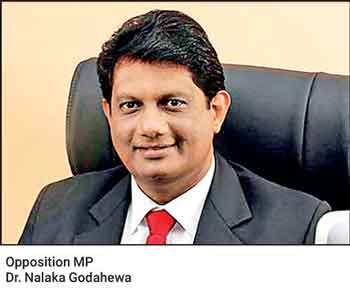Sunday Feb 22, 2026
Sunday Feb 22, 2026
Saturday, 16 September 2023 00:30 - - {{hitsCtrl.values.hits}}
 Opposition MP Dr. Nalaka Godahewa at a media briefing yesterday, exposed what he described as “harsh realities” of economic challenges in 2023.
Opposition MP Dr. Nalaka Godahewa at a media briefing yesterday, exposed what he described as “harsh realities” of economic challenges in 2023.
“When analysing the Central Bank’s 2022 data, it becomes abundantly clear that the aspiration of building a thriving export-oriented economy under the current Government is nothing but a pipe dream,” he said at the briefing where he took the opportunity to give a comprehensive explanation of the country’s present economic situation.
According to Central Bank data, by the end of the first half of 2023, the Trade Account exhibited a deficit of $ 364 million, a significant departure from the $ 22 million surplus recorded in June 2022. Furthermore, export earnings and import expenditures for the first half of 2023 had both declined by 10% and 18.6%, respectively, compared to the previous year.
Earnings from industrial products, primarily driven by the apparel industry, had contracted by 12%, plummeting from $5,260 million to $4,616 million in comparison to the first half of 2022—a drop of $650 million. Notably, the garment industry, a critical export sector, experienced an 18% decrease, declining from $5,260 million to $2,461 million in comparison to the first half of 2022, resulting in a substantial $516 million reduction.
Dr. Godahewa argued that this compelling evidence pointed to a failure in achieving an export-oriented economy, as advocated by the President. However, he emphasised that tourism revenue and remittances from foreign workers, which were not included in the trade balance, could potentially offset the balance of payments deficit if the Government continued to postpone settling foreign debts. Consequently, there should be no issue with importing oil and gas until debt repayment commenced, he pointed out, stressing that economic growth was the only way to manage these utilities while servicing debts simultaneously.
Nonetheless, Dr. Godahewa noted the overall state of the economy was concerning, with four consecutive quarters of economic contraction. In the first quarter of 2023 alone, the economy had contracted by 11.5%. He speculated that the contraction in the second quarter would be even more pronounced, although Central Bank reports were delayed.
The MP expressed optimism that the Government would secure the second instalment of the promised $2.9 billion loan over five years from the IMF. However, he cautioned against viewing this positively, as many of the measures adopted could have long-term detrimental effects on the country. For example, he highlighted the reduction of employees› pensions due to domestic debt restructuring and the loss of numerous jobs due to the Government›s economic mismanagement, particularly, in key employment sectors such as construction and the garment industry.
Working class financially drained by raised taxes
To meet IMF demands, the Government had raised taxes, leaving the working population financially strained. The Government aimed to increase tax revenue by 70% by 2023, with tax revenue expected to rise from Rs. 1,852 billion in 2022 to Rs. 3,130 billion in 2023. This meant a 70% reduction in disposable income for most people, who already spent the majority of their earnings on basic necessities such as food, electricity, and water.
Dr. Godahewa emphasised that there was little money left for essential expenses like education, healthcare, and clothing. This tax burden had driven professionals to leave the country in large numbers, with over 800 doctors, more than 300 specialist doctors, over 1,000 engineers, over 500 university professors, and thousands of other professionals departing in the first half of 2023. This brain drain raised concerns about the nation’s ability to build and develop in the future.
The MP continued to assert that the Government’s unreasonable tax policy was ineffective. He pointed out that when taxes were reasonable, people and businesses were more compliant, whereas excessive taxes led to immigration and business closures. By June 2023, the Government had only managed to collect 77% of the expected tax revenue, amidst a significant economic downturn.
Govt attempts to stifle democratic process
The MP criticised the Government for attempting to stifle democratic processes, referencing recent remarks by the President of the United National Party concerning the availability of funds for oil and gas in the event of a 2024 election.
Dr. Godahewa argued that the Government’s decision to cancel Local Government elections due to financial constraints was questionable. The Election Commission had initially requested Rs.10 billion for the LG election, which was later reduced to Rs. 4 billion. Nevertheless, the Government claimed it could not afford to allocate the Rs. 4 billion for the election, even though they had earmarked an additional Rs. 1,390 billion as Government expenditure for 2023 compared to 2022. Dr. Godahewa pointed out that a mere 0.3% of the total estimated Government expenditure was required to fund the election.